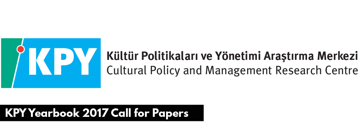KPY
KPY Yearbook 2017 Call for Papers

November '17
ABOUT THIS ISSUE
Cultural Policy and the People: the rise of Populism and the crisis of Political Pragmatism'
The cultural realm is being challenged all over the world. In 'post-truth' societies, where the emotion of the 'masses' once again become the engine of political thought, cultural policies find themselves at a crossroads. Years of political pragmatism in the face of the demands of politicians, public bureaucracies and the popular press, have inculcated in us an acceptance of the political scrutiny and evaluation of culture, of evidence-based cultural policies for example, providing justifications for juries and committees in their spending public money on cultural and the arts. The imperatives of “impacts” and measurable achievements often aim for noble causes, such as the fight against poverty, raising the levels of employment, contributing to public health, and so forth. However, our political pragmatism is facing a new level of demand: the global rise of populism, where new populist policies, often based on emotions or rhetoric, are influencing cultural policies more than any fact or evidence-based need. Their rhetoric, although not yet prevailing, is influencing not only our concepts of “audiences” as “consumers”, but also citizens, the public good, and the roles of policy makers and cultural workers in providing projects for a public realm that requires the enthusiasm of "the people". From public projects such as Skopje 2014 in Macedonia to the past countless “national investments” that mimic the “Bilbao effect”, invoking the spectacularity of the image, affect and past invocations of national greatness.
This thematic issue will seek to interrogate our past political pragmatism in the face of the current global rise in populism. Globally, the Left is railing against the perceived rise in popular politics. In the present, a culture of fear (Moisi) is emerging -- and it seems that populism is the prevailing response of new political actors on the world scene. They are raising the emotions and expectations of the impoverished masses, presenting both the political, but especially “creative class” and cultural elites, as the "privileged" in society and unjustly sequestering public wealth.
This journal thematic issue will explore how populist discourse, both rightist (in US and Europe) and leftist (South America and few of EU countries), is or will impact cultural policies, and the potential responses that cultural policy actors and agencies may have. How do we respond to populism, and the demands that purportedly represent "the people" or the majority?
Contributing authors might also explore the global, supranational and local cultural processes that are still facilitating political pragmatism in response to governmental demands for special justification through evidence-based cultural policies, mass appeal social capital or public value. The instrumentalization of culture (i.e. particularly applied theatre and arts), in relation to institutionalised political power remains an important topic for research, as does the use of culture for worthy purposes, such as social integration, integration of migrants, public health issues promotion, educational development, poverty alleviation, local community and their economies, and so on.)
This could include:
• The global rise of populism and specific responses by the agencies of cultural policy.
• Pragmatism and instrumentalism in urban cultural policy and cities.
• Culture for the people: historical policy dilemmas for democracy and culture for the public good.
• Representing citizens: from the mob, the masses, the crowd, the working classes, the 'multitude'; from popular culture to cultural democracy; from nationalist monoculture to multicultural diversity; from street culture to new localism and community and the 'commons').
• Populism, fascism, authoritarianism and demagoguery in culture.
• Culture and policy activism against populism.
“The South African government tabled a draft White Paper on Arts, Culture and Heritage in 2016 as a new policy statement twenty years after the adoption of the first post-apartheid cultural policy document in 1996. Then, the challenge was to affirm the right of all South Africans – rather than only white South Africans – to “participate in the cultural life of the community and to enjoy the arts”. The current draft policy document seeks to respond to the key contemporary challenges of poverty, unemployment and inequality, legacies of the apartheid past but exacerbated over the last twenty-two years.” (Mike van Graan, KPY key-note lecture 2017). This is an example of the complexity of instrumentalisation and the role of political pragmatism. We therefore need to move beyond generalisations and moral polarisations, and to understand the place-based cultural politics of cultural policies and the specific implications of their pressure to deliver on political, social and economic agendas.
Together, the contributions to this thematic issue would enable the cultural policy community to evaluate the latest national cultural responses to rising global populism, their past political pragmatisms, and the way cultural policies play a critical role in national democracies and self-determination, the politics of cultural identity, memory and forgetting (the role of emotions, identity challenges, authenticity and spirituality), the role of key international cultural policy documents in relation to global policy trends, and the historical political discourses that still insist on democratic processes and transparency in decision-making (process of decision-making as value per se in cultural policy), in policy, public culture and our political institutions.